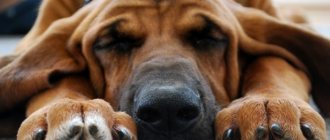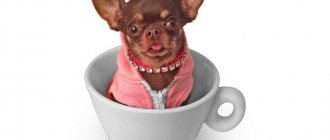Like people, the duration of wakefulness of four-legged pets primarily depends on age. Puppies and older animals spend the most time in the kingdom of Morpheus.
But there are other factors, including some that can pose serious health risks. For this reason, every responsible owner should know how many hours a day a dog needs to sleep and in what cases it is recommended to take it to the veterinarian.
Stages of sleep in dogs
How long should a dog sleep: stages of sleep in dogs
It has been established that the structure of dog sleep is no different from human sleep and includes several stages:
- Nap . The primary stage of sleep, contributing to the partial restoration of vital energy. A dozing dog is in a relaxed state, but can control what is happening.
- Superficial (shallow) sleep . The second stage, during which tissue repair processes are activated in the animal’s body. The dog is completely relaxed, but is able to detect loud sounds.
- Deep dream. Replaces the phase of superficial sleep and is characterized by the absence of dreams. In the deep stage, the dog rests fully, snoring or snoring.
- Quick sleep. The shortest phase, accompanied by increased brain activity and processing of received impressions. A dog that is sleeping begins to twitch its paws, move its eyes closed, change body position, wag its tail, whine or bark.
The REM sleep phase is followed by complete awakening or a transition to the deep stage.
Health
Your dog's overall health can affect how long he sleeps. Chronic diseases such as:
- Disorders of the cardiovascular system and blood pressure.
- Arthritis. Pain in the joints leads to the fact that the pet cannot fully relax. Any movement of the paws increases pain and disrupts sleep.
- Kidney diseases and renal failure. Disruption of the urinary system leads to a decrease in the production of melatonin, the hormone responsible for sleep.
- Infectious or viral diseases. For example, a dog may catch a cold while walking in the rain, its temperature will rise, which will affect the quality of sleep.
- Stress. The environment also affects your pet's health. If there is shouting, quarrels, fights in the family, or the animal is twitching uncontrollably from children, kicking, then he is constantly in a state of stress. The animal sleeps poorly, becomes irritable and aggressive.
Another important factor affecting sleep is obesity in a dog. The owner’s desire to stuff the pet with everything, an incorrectly selected diet or a sedentary lifestyle leads to the accumulation of visceral fat in the abdominal cavity. It puts pressure on the internal organs, shortness of breath occurs, and blood circulation throughout the body is disrupted.
Important! To restore quality sleep in a dog, you need to seek help from a veterinary clinic and conduct a series of examinations and treatment.
When and how do dogs sleep?
Dogs living in an apartment are not concerned about searching for food and do not have to constantly remain on guard in case of danger. Therefore, they can relax and doze most of the day and sleep soundly at night. Guard dogs tend to be light sleepers. If one dog barks on the street, the rest begin to bark after him.
In winter, dogs sleep on a bed. In hot weather, dogs move to the floor or to secluded, cool places.
Dogs sleep in different positions - curled up, lying on their back, side or stomach:
- On the back. In this position, the animal's most vulnerable places are exposed - the belly and throat. A dog sleeps on its back only if it is very tired, completely relaxed and in a comfortable environment.
- On the stomach. This position is typical for puppies who are ready to quickly wake up and start playing, and for watchdogs guarding the territory. A dog that sleeps on its stomach hears everything and can jump up at any moment.
- On the side. This is how dogs usually sleep in the heat. Most often, animals stretch out on the floor, covering their vulnerable spots, and fall into deep sleep.
- Curled up. Domestic dogs sleep curled up in a ball when it's cold. Stray dogs must remain constantly on guard and the curl up position allows the animals to cover weak points and quickly jump up in case of danger.
Why is sleep necessary?
A dog needs to sleep so that it grows up healthy. Every part of a puppy's body, from the brain to the tendons, grows very quickly. Sleep allows you to replenish energy and vitality in order to grow and develop properly. The pet constantly studies the multifaceted world around it, and also learns new things. Sleep is essential to maintaining a healthy waking state. Through quality rest, a dog can process and explore the countless experiences he experiences while he is awake.
We advise you to read: What vaccinations are given to puppies and at what age
Dependence of sleep on age - table
Adult dogs sleep on average 12-16 hours a day. Puppies and older dogs spend more time relaxing.
| Dog age | Sleep Features |
| 1-4 months | Puppies only wake up to eat and sleep 20 hours a day. Well-fed babies do not react to light, noise and other external stimuli. |
| 4-6 months | At this age, puppies enter adolescence and become more active. Sleep duration is reduced to 16-18 hours. Sleeping dogs react to stimuli and may awaken during the night. |
| 6-18 months | This period marks the peak of dog activity. Animals move a lot, play and explore the world around them. Dogs quickly regain strength and sleep 12-14 hours a day. |
| 2-10 years | The body activates aging processes and slows down metabolism. Older dogs lack energy and sleep 20 hours a day. The sleep of older dogs is often interrupted by noises, smells, sounds and other external stimuli. |
Amount of sleep
Newborn puppies spend almost 90% of the total time of the day sleeping. Growing individuals can sleep from 15 to 18 hours, or more precisely ¾ of the day. As you mature, your sleep time will gradually decrease. The puppy may fall asleep suddenly, even while eating or playing. Unprepared owners may be surprised and even frightened by this feature of their pet, but experts assure that there is no need to worry. In the first year of life, the baby will most likely be hyperactive, he will be especially interested in scratching and chewing objects, he will run and jump a lot, and after that he will sleep soundly.
The more active a dog is, the more time it will spend sleeping. As the puppy grows up, he will sleep less, but not less than 50-65% per day. Babies up to 2-3 months sleep almost around the clock. They can fall asleep on the go, with their faces buried in a bowl. In addition to games and fun, puppies innately want to protect the territory, but if they are well-fed, they are immune to outside stimuli. In addition to sleeping, adult dogs can also doze.
Dog's daily routine
Animals, like people, develop the habit of a certain cyclicity. A dog's ability to adapt to a specific routine depends on the overall activity and flexibility of the nervous system. When kept in apartments, dogs easily adapt to their owner’s schedule.
An approximate daily routine for domestic dogs looks like this:
- Get up in the morning 5-10 minutes before the alarm, go for a walk, eat.
- Deep sleep or napping alone while the owner is working. The dog periodically gets up, drinks water and listens to sounds on the staircase. But most of the time the dog sleeps soundly or dozes.
- Meeting the owner from work, a long, exhausting walk and dinner.
- Long night sleep.
On weekends, your pet's routine is more varied. The dog is taken out of town so that he has the opportunity to run around without a leash and explore unfamiliar places. An abundance of movement and new experiences help improve the animal’s condition and normalize sleep.
Some dogs have a flexible nervous system and do not suffer from regular disruptions to their established routine. Hunting, guard or hyperactive dogs have a hard time with frequent disruptions to their usual routine. Such animals require special handling and may become stressed if the owner goes on a business trip or is delayed at work.
We recommend reading:
- Why does my dog shed a lot?
- Why does a dog eat cat excrement (poop)?
- How to properly clean a dog's ears at home?
Possible violations
Many factors influence the duration and quality of sleep. First of all, these are hormones. If a dog suddenly begins to sleep poorly, twitch, or behave restlessly at night, and this condition continues for several days, this is a reason to think about violations.
Important! If poor sleep is accompanied by excessively rapid breathing or excessive sweating, then the owner may suspect a disorder in the metabolism of thyroid hormones. You need to take your pet to the vet.
Howling at night, waking up abruptly, or even sleepwalking may indicate the presence of neurological diseases. Especially if before this the dog had some kind of injury or blow to the head (accident, accident or cruel former owners).
Deep sleep, longer than usual for no apparent reason, indicates depression. This is possible if the dog misses its owner when he is away from her. Or when the puppies are taken away from the mother, then she will also be depressed for some time and want to sleep more.
Dogs sleep longer when depressed
It is impossible to give an ideal answer to the question of how much puppies sleep at 2 months, at one year, two months, etc. Sometimes even genetics influences this factor. Having slept 2-3 hours less than normal, the dog still feels good, if this is in its genes.
Sleep is an individual state for a pet. It is influenced by a comfortable bed, breed, genetics, the region where the animal lives, and even the regime of the owners themselves. But there are a lot of reasons for sleep disturbances.
You can’t panic in advance and make diagnoses yourself. Sometimes the reasons can be trivial, and sometimes serious. Only a veterinarian can confirm this, as well as prescribe treatment. Therefore, if you notice deviations in this process, you should not waste time. Dog owners should contact their veterinarian first.
Factors of influence
In order to more accurately determine how many hours dogs should sleep, taking into account individual subjective and objective characteristics, it is necessary to pay attention to the following factors:
- Age. Pets under the age of 3 months and older than 8–9 years need additional rest, since the former need more time to grow, and the latter to recuperate. But no matter how old the dog is, she will sleep as much as she wants (it is impossible to force her).
- Breed. The larger the animal, the longer it should sleep. In addition, the duration of sleeping is often determined by the purpose of breeding (service breeds tend to stay awake, while decorative breeds traditionally lead a sedentary lifestyle).
- Health status. Stressed or sick dogs, depending on how long their experience or illness lasts and progresses, may sleep all day or, conversely, suffer from insomnia.
- Living conditions. Yard dogs have no time to sleep for a long time, because they have too many things to do and interests, and those living in an apartment, at best, only get the view from the window. Depending on how many other inhabitants live in the apartment and how often they are at home, the dog can also be always busy or constantly bored alone and, accordingly, sleep a lot.
Additionally, the reasons why dogs sleep a lot may be external. For example, the weather, which affects pets in the same way as people. Cloudiness or rain, as well as excessive heat, usually cause drowsiness, while bright sunny days increase activity.
What should I do when my puppy cries at night?
7 Tips to Stop Your Puppy from Crying at Night
- Never underestimate the power of the pot! Not in the literal sense of the word potty, of course, but potty training. ...
- Train your puppy to crate. ...
- Provide comfort, but not attention. ...
- Carry your puppy - every day. ...
- Follow a daily routine. ...
- Limit access to distractions. ...
- Check for other problems.
THIS IS INTERESTING: Why is my dog such a biter?
Ideal place to sleep
Many owners are happy when they notice that their little pet is able to fall asleep anywhere and at different times of the day. However, in such an environment the sleep will not necessarily be quite comfortable and sound. It is important to provide comfort to the puppy so that he replenishes his vital energy and spends it on games and training. Understanding the environment is exciting and at the same time too tiring for a pet who has just begun to develop in this world. The puppy may not even feel tired.
A few recommendations for owners:
- It is important to provide your pet with a personal den where no one will disturb him. Ideally, a place to sleep should be comfortably furnished, it should have blankets, pillows, rugs that are easy to wash;
- For a dog, silence is important, where there is no music, people talking, laughter or other sounds. If there are children in the house, then it is worth teaching them not to disturb the pet during sleep;
- if an ideal place for a puppy’s den is found, then you should not move it to another place, so as not to traumatize the baby’s psyche;
- At night, the light in the room where the pet sleeps should be dimmed. It is worth considering that if your pet wakes up alone in the dark, this could be a bad experience for him. It is important to give your pet something that will remind you of its owner. It could be a T-shirt, something he can lean against. The owner's scent will calm the little pet if he is afraid of the dark;
- The puppy must be taught to sleep in its place. Sleeping in inappropriate places such as a bowl, toilet or toys should not be encouraged. It is important in the early stages of development to teach your pet to sleep in a certain one place.
We advise you to read: What to feed a puppy per month
About insomnia
Insomnia is ineffective sleep. Sleep is assessed by the criterion - what percentage of the time the pet actually sleeps, out of the time that it could spend in dreams. The completeness of a puppy's sleep can be calculated by the time of rest in the period from 1 am to 5 am. In small pets, the efficiency of rest is always below the norm (below 85%). Of the larger dogs, the ones most susceptible to insomnia are the Shiba Inu, the Pug and the Weimarainer (sleep efficiency is about 84%).
Small breeds of dogs have critical indicators of adequate sleep:
- (79.7%) Pomeranians sleep;
- (82.5%) goes to rest with a Yorkshire Terrier;
- (about 83%) breeds are poodles, rat terriers.











